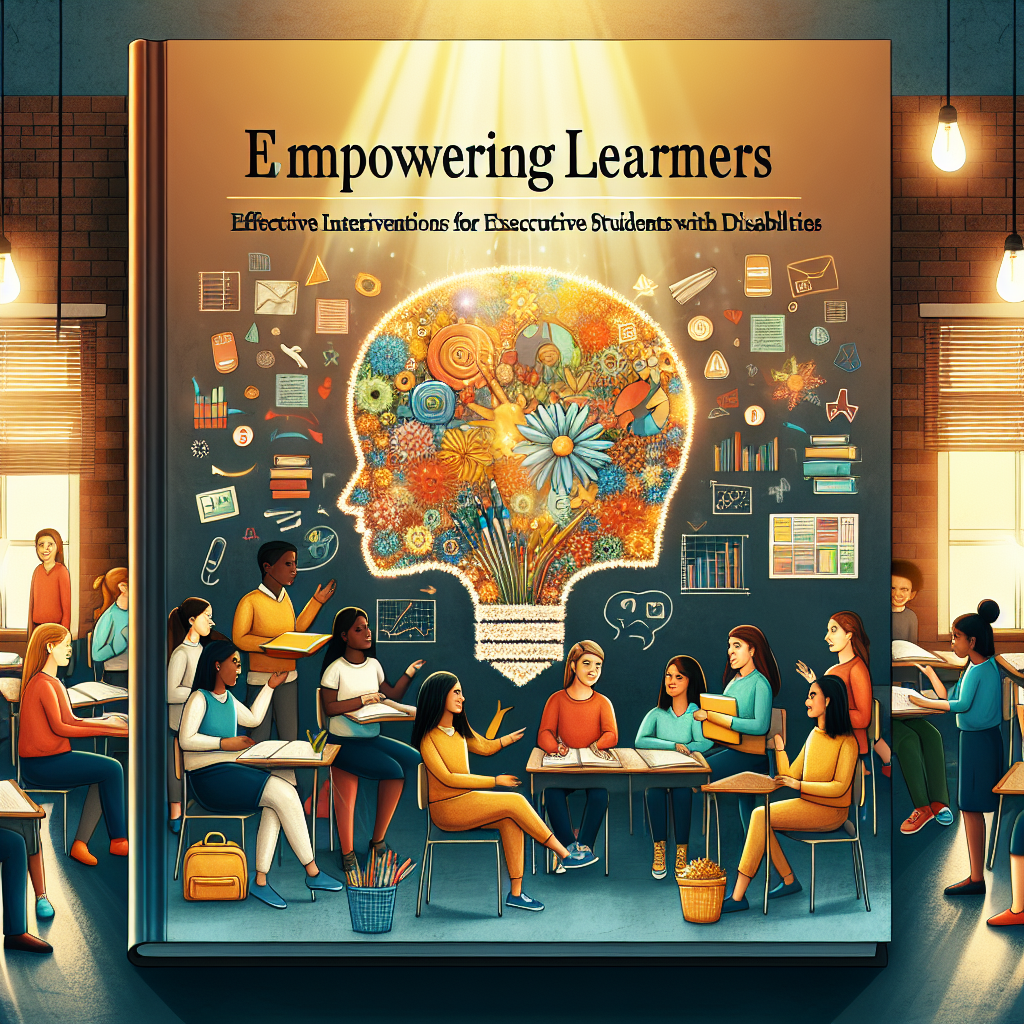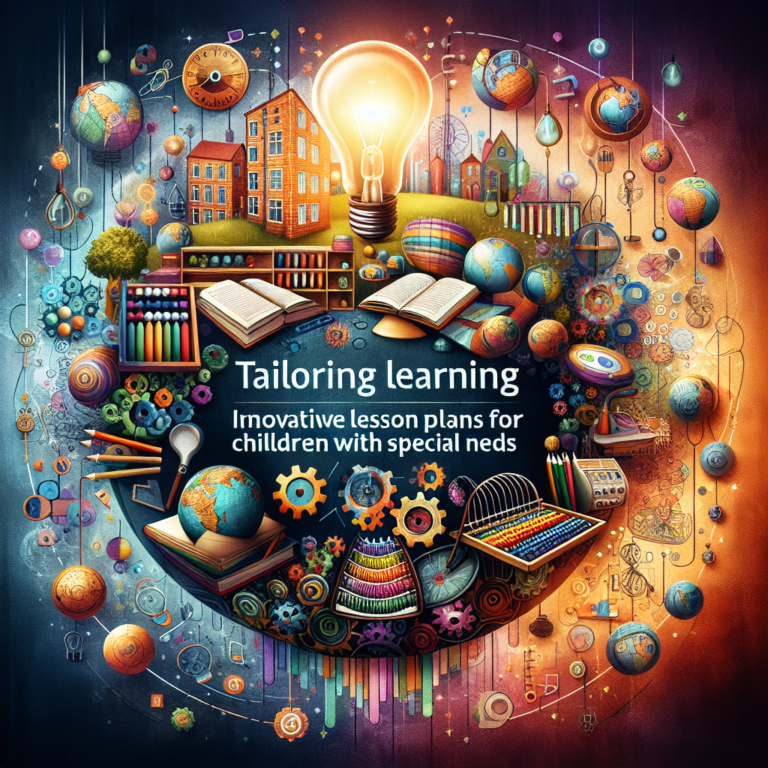
Empowering Learners: Proven Interventions for Executive Functioning in Students with Disabilities
Introduction: The Importance of Empowering Learners
Imagine a classroom where every student feels confident, organized, and prepared to tackle their assignments. For many students with disabilities, especially those facing challenges in executive functioning, this scenario can feel like a distant dream. Executive functioning skills—like planning, organization, and emotional regulation—are crucial for success in school and beyond. In this article, "Empowering Learners: Effective Interventions for Executive Functioning in Students with Disabilities," we will explore proven strategies that can transform the educational experience for these learners.
Understanding and supporting executive functioning can empower learners, providing them with the tools they need to navigate their academic journeys and personal lives effectively.
Understanding Executive Functioning
Before delving into interventions, it’s essential to understand what executive functioning entails. According to clinical research, executive functioning includes several cognitive processes that help individuals manage their thoughts, emotions, and actions. These processes are integral to tasks such as:
- Task Initiation: Starting a task without procrastination.
- Organization: Keeping materials and thoughts orderly.
- Working Memory: Retaining information temporarily to complete tasks.
- Emotional Regulation: Managing emotional responses to challenges.
For students with disabilities, particularly those diagnosed with ADHD, autism spectrum disorders, or learning disabilities, executive functioning difficulty is often a barrier to academic success.
| Executive Functioning Skills | Definition | Importance |
|---|---|---|
| Task Initiation | Starting tasks independently | Prevents procrastination |
| Organization | Structuring materials and thoughts | Enhances clarity and efficiency |
| Working Memory | Maintaining information for task completion | Aids in learning and application |
| Emotional Regulation | Managing emotions effectively | Helps in navigating challenges |
Identifying Challenges: The Student Perspective
Let’s hear from "Alex," a high school student with ADHD. Alex often feels overwhelmed by assignments, leading to missed deadlines and frustration. In a recent survey, Alex reported:
- Difficulty organizing thoughts on paper.
- Experiencing anxiety when faced with multiple tasks.
- Struggling to keep materials in order.
These challenges illustrate the profound impact of executive functioning deficits on students’ learning experiences.
Effective Interventions for Executive Functioning
1. Structured Supports: Creating a Framework for Success
One of the most effective ways to empower learners with disabilities is through structured supports. These systems help create a predictable environment in which students can thrive.
Case Study: The Use of Visual Schedules
In a middle school classroom, the teacher implemented visual schedules for her students, including those with executive functioning challenges. Each student received a personalized, color-coded chart detailing daily tasks.
Analysis: Visual schedules provide clarity and lower anxiety, helping students like Alex understand what is expected and when.
Key Takeaway: Empowering learners through structured routines fosters independence and builds confidence.
2. Cognitive Behavioral Strategies: Reframing Thought Patterns
Cognitive Behavioral Therapy (CBT) techniques can be transformative for students struggling with emotional regulation.
Case Study: Emotional Check-ins
At a local special education program, staff introduced daily emotional check-ins for students. Each student rated their feelings and discussed strategies to manage them.
Analysis: Emotional check-ins allow students to become aware of their feelings, contributing to better management of classroom behaviors and tasks.
Key Takeaway: Encouraging self-awareness through emotional regulation initiatives empowers learners to address their challenges proactively.
3. Goal Setting and Self-Monitoring Techniques
Teaching students to set specific, measurable, achievable, relevant, and time-bound (SMART) goals can significantly enhance their executive functioning skills.
Case Study: Personalized Goal Setting
In a collaborative effort between teachers and parents, students created a goal-setting framework. For instance, Alex worked with his teachers to outline academic goals for each subject.
Analysis: Personalized goals give students ownership of their learning, promoting organization and proactive behaviors.
Key Takeaway: Empowering learners by guiding them in goal-setting helps develop critical executive functioning skills.
4. Engaging Technology and Apps
In today’s digital age, technology can be a game-changer for supporting executive functioning. Diverse applications can assist with organization and time management.
Case Study: Digital Calendar Implementation
A high school implemented a calendar app that reminded students of deadlines and important dates. Alex began using it to manage assignments, and his grades improved.
Analysis: Technology serves as an external aid that compensates for executive functioning deficits, making it easier for students to stay on track.
Key Takeaway: Empowering learners with technology can bridge gaps in executive functioning skills.
5. Collaborative Learning Environments
Creating collaborative learning opportunities encourages peer support, which can be especially beneficial for students with disabilities.
Case Study: Peer Mentorship Programs
One school launched a peer mentorship program where students with disabilities were paired with classmates who excelled in executive functioning.
Analysis: This initiative not only helps students learn effective strategies but also promotes inclusion and empathy.
Key Takeaway: Collaborative learning reinforces skills and provides a sense of belonging, empowering all learners.
Summary of Interventions
| Intervention Type | Description | Outcome |
|---|---|---|
| Structured Supports | Visual schedules to guide tasks | Increased organization and reduced anxiety |
| Cognitive Behavioral Strategies | Emotional check-ins to develop self-awareness | Enhanced emotional regulation and coping mechanisms |
| Goal Setting and Self-Monitoring | SMART goals for academic achievement | Improved focus, accountability, and independence |
| Engaging Technology | Digital tools for organization and task management | Better time management and improved academic performance |
| Collaborative Learning | Peer mentorship to support learning and skills | Develops empathy and practical strategies for academic success |
Conclusion: Empowering Learners to Thrive
Empowering learners with effective interventions for executive functioning is not merely about improving academic performance; it is about fostering independence, resilience, and confidence in students with disabilities. By implementing structured supports, encouraging self-awareness, leveraging technology, and nurturing a collaborative environment, educators can make a profound difference.
As we navigate the complexities of learning, remember the potential within every student. By embracing "Empowering Learners: Effective Interventions for Executive Functioning in Students with Disabilities," we pave the way for a brighter future where all learners can thrive.
FAQs
1. What are executive functioning skills?
Executive functioning skills encompass cognitive processes like planning, organization, and emotional regulation, essential for effective learning and task completion.
2. How can teachers support students with executive functioning challenges?
Teachers can implement structured supports, use visual aids, teach goal-setting, and integrate technology to help students manage their challenges.
3. Are there any specific apps recommended for executive functioning support?
Popular apps include Todoist, Trello, and Google Calendar, which help students with organization and time management.
4. Can parents play a role in developing executive functioning skills at home?
Absolutely! Parents can encourage goal setting, establish routines, and facilitate emotional check-ins to help develop their child’s skills.
5. What is the impact of peer support on executive functioning in students?
Peer support fosters a collaborative learning environment, encourages the sharing of effective strategies, and enhances social skills, vital for executive functioning.
In summary, by investing in effective interventions for executive functioning, we can make a significant difference in the lives of students with disabilities. Let us embrace the challenge and empower the next generation of learners.















